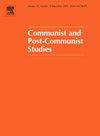毛主义在墨西哥的存在
IF 1.3
4区 社会学
Q3 INTERNATIONAL RELATIONS
引用次数: 0
摘要
冷战期间,毛主义作为建立新国际秩序的第三种方式的影响激发了几个拉美游击队,包括墨西哥的一些游击队。本文特别分析毛主义在墨西哥的影响,并特别关注农民领袖Florencio Medrano如何受到毛主义思想的激励,建立自治社区rub本文章由计算机程序翻译,如有差异,请以英文原文为准。
The Presence of Maoism in Mexico
During the Cold War, the influence of Maoism as a third way of establishing a new international order inspired several Latin American guerrilla groups, including some in Mexico. This article analyzes the influence of Maoism in Mexico in particular, and pays specific attention to how Florencio Medrano, a peasant leader, was motivated by Maoist thought to establish the Rubén Jaramillo Proletarian Neighborhood, a self-governing neighborhood, and how this site was considered a critical factor for his development as a guerrilla. In the continuing debate over the relationship between agency and structure, the life and work of Florencio Medrano evidences how both social context and personal history influenced his aspirations and demands. By conducting an analysis of primary and secondary sources, this article analyzes some elements of Maoist thought and its diffusion in Latin America in the context of the Cold War. In addition, the article explains the political formation of Florencio Medrano in the Mexican post-revolutionary period, examines Maoist influences on his political formation and participation in pro-communist organizations, and reviews Maoist influence on the organization of the Rubén Jaramillo Neighborhood. Finally, the conclusions emphasize how the peasant origins of Medrano gave rise to his particular understanding of Maoism.
求助全文
通过发布文献求助,成功后即可免费获取论文全文。
去求助
来源期刊

Communist and Post-Communist Studies
Multiple-
CiteScore
1.90
自引率
0.00%
发文量
23
期刊介绍:
Communist and Post-Communist Studies is an international journal covering all communist and post-communist states and communist movements, including both their domestic policies and their international relations. It is focused on the analysis of historical as well as current developments in the communist and post-communist world, including ideology, economy and society. It also aims to provide comparative foci on a given subject by inviting comments of a comparative character from scholars specializing in the same subject matter but in different countries.
 求助内容:
求助内容: 应助结果提醒方式:
应助结果提醒方式:


